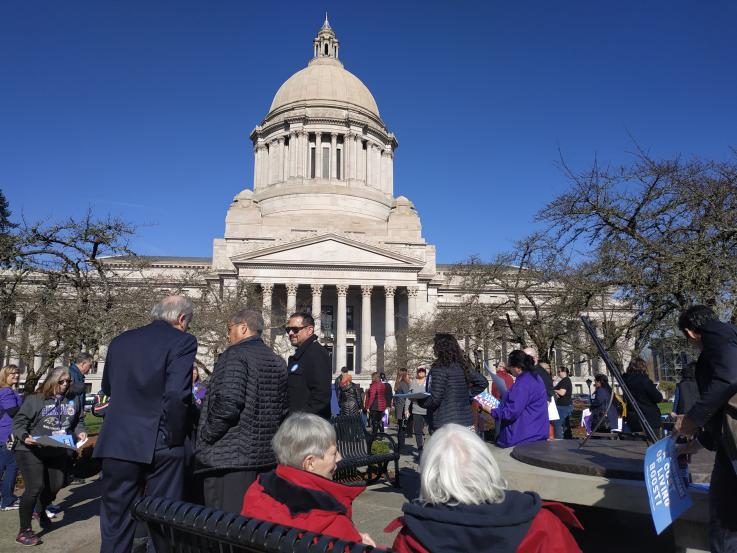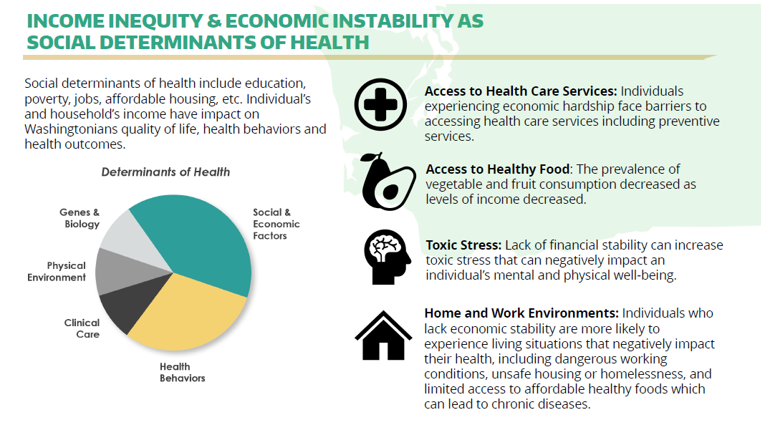
The School of Public Health’s annual MPH Practicum Symposium is an opportunity for students to present their research and experiences from their immersive, team-based practicum work that addressed real-world public health challenges. This year, 40 total students participated in the symposium, sharing details of their work with staff, faculty, and fellow students. Of those 40, 17 were Global Health students.
Mame Mareme Diakhate, who has worked as a research assistant on Minimally Invasive Tissue Sampling (MITS) in the Childhood Acute Illness and Nutrition Network (CHAIN) study, completed her practicum at UW with the Global Center for Integrated Health of Women, Children, and Adolescents (Global WACh). Co-led by Christine McGrath and Kirk Tickell, Diakhate’s practicum focused on malnutrition between mothers and their infants, specifically infants between the ages of six and 12 months in Kenya.
Diakhate helped create an intervention that trained mothers to test their children for malnutrition and send results to the staff conducting the trial. Diakhate was also part of the design, development, and roll out of this trial, known as Mama Aweza, which is ongoing.
Katie Fox, a second-year MPH candidate in DGH’s Leadership, Policy, and Management track, worked with the Health Workers for All Coalition in Amsterdam during the summer of 2019. Advised by Julia Robinson of Health Alliance International, Fox helped support the Coalition’s communication materials by generating a stakeholder engagement map, assisting in their web design and social media content creation, and developing a theory of change.
Fox joined the Coalition when it was only a year old. Upon joining, she began to identify avenues for growth, organizing one-on-one meetings with the coalition’s co-chairs and finding strategic partners. With the ultimate goal of strengthening health workforce advocacy, Fox gave a presentation to the Coalition’s members in January 2020, and also published a blog post for their website about gender equity and health labor migration.
Haris Apriyanto’s practicum examined economic inequity in Washington State and how that becomes a health issue. Research showed that conditions including hypertension, diabetes, and asthma all increase as income decreases. He then put together a factsheet and poster to raise awareness on how economic inequity impacts the health of Washingtonians, as access to things like health care and nutritious food also decrease for people in lower-income settings. For his practicum, Apriyanto worked with the Washington Physicians for Social Responsibility (WPSR) in the Economic Inequality and Health program.

His presentation advocated for tax reform for lower-income families through the Working Family Tax Credit Coalition and the Balance Our Tax Code movement. By balancing Washington’s tax code, economic inequity could become less of a health issue as rich families would have a larger percentage of their income go toward local and state taxes. Rather than the working, lower-income families losing a substantial amount of money that exacerbates their issues of access for healthcare resources and food, health equity could be obtained by balancing the state’s tax codes. Ahoua Kone was the faculty advisor on Apriyanto’s practicum.
For his practicum, Edgar “Coco” Calderon turned his attention to victims of gender-based violence (GBV) in Colombia. By partnering with Sinergias, a Colombian non-profit organization, Calderon took an intercultural approach to review and evaluate the routes of attention for GBV victims from indigenous tribes in the Amazon. After assessing the current routes of attention, Calderon worked with local leaders and faculty advisor Scott D. LaMontagne to find a new approach.
Calderon reported that indigenous people did indeed view GBV as a problem in their villages, and they noted that it needed proper identification and channels of prevention. They deemed it necessary to find more appropriate methods of reporting gender-based violence. With Calderon, the villages determined a plan of action that included the village captain talking to the couple involved in the violence and making reprehensions if need be before calling in all committee leaders or formal justice system.
Students from the Epidemiology, Health Services, Nutritional Sciences, Public Health Genetics, and Environmental & Occupational Health Sciences programs and departments were represented at the symposium as well, hosted by the UW School of Public Health.